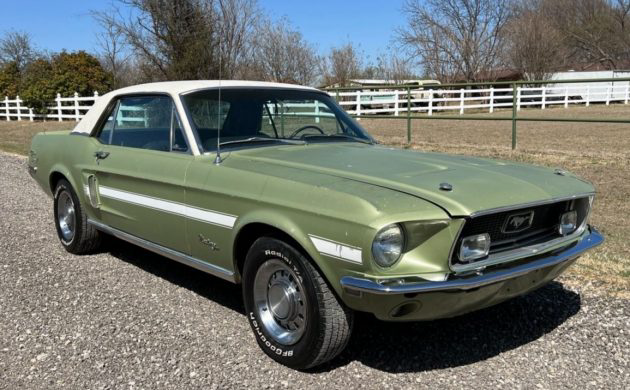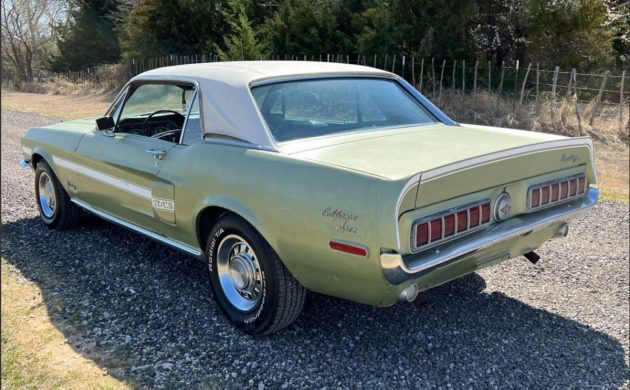Two Owner Survivor: 1968 Ford Mustang GT California Special
By traditional standards, the 1967 model year would have been considered a success for the Mustang. However, Ford was addicted to the record sales achieved during 1966, and 1967 marked a drop of around 22%. Keen to arrest this decline and take the fight to the Chevrolet Camaro and Pontiac Firebird, the company introduced a regional special called the GT California Special (GT/CS) for 1968. Designed to entice potential buyers into showrooms, it failed to address the sales slide and didn’t sell in the numbers Ford anticipated. Our feature GT/CS is a two-owner classic that recently emerged from a Texas barn. It has lain idle since 1986, but the seller has coaxed it back to life. The buyer will need to decide whether a cosmetic restoration is the appropriate course of action or whether they’ll retain it untouched. Located in Springtown, Texas, you will find the Mustang listed for sale here on eBay. The seller has set a BIN of $26,800, although there is the option to make an offer.
Ford produced the GT/CS as a cosmetic package, turning to Carroll Shelby for assistance. The company drew inspiration from the iconic “Little Red” prototype, and many of its design features found their way onto this production model. These included non-functional side scoops, a decklid with an integrated spoiler and quarter panel extensions to match, functional hood slats to extract heat from the engine bay, taillights from the 1965 Thunderbird, chrome “California Special” badges on the rear quarter panels, and distinctive side stripes. These features remain intact on our feature car, although at least one of the chrome badges is damaged. Reproduction badges sell for around $90 each, so rectifying that problem won’t prove expensive. The original owner ordered this classic in Lime Gold with a White vinyl top. They drove the car regularly until parting with it in 1986. Its second owner immediately parked the car in a barn, and it recently emerged with a few cosmetic issues. The paint and panels wear a collection of minor flaws and defects, while the vinyl is wrinkled and lifting. If the buyer elects to perform a cosmetic refresh, it should be a straightforward process. Alternatively, they could retain it untouched, driving it proudly as an original survivor. They won’t need to worry about rust, with the panels clean and the underside exhibiting little beyond some dry surface corrosion. One item worth noting on this vehicle is its grille. As part of the GT/CS package, the grille was devoid of the usual Mustang center badge. It is present on this car, suggesting that the grille has been replaced or someone has added the badge out of personal preference.
If potential buyers consider this Mustang a survivor, its interior presentation is serviceable. For those aiming for something better, it has a few needs. The seller replaced the carpet, but it needs some stretching to fit correctly. The covers on both front seats are split, with the deterioration looking beyond repair. The remaining upholstered surfaces look okay, as does most of the dash and the pad. The gauge surrounds exhibit the usual faded chrome, but with replacement binnacles available for around $90, this will hardly break the bank. The wheel sports several cracks, and while replacement may seem the obvious choice, there are other options worth considering. Several companies offer epoxy kits that can provide a seamless repair. These sell for under $100, and the buyer could undertake this satisfying task themselves in a home workshop. The factory radio is missing, so the buyer will need to source a replacement. The original owner ordered this classic with air conditioning, and although the system is largely intact, the compressor sits in the trunk. Overall, whipping this interior into shape could be an affordable part of this restoration.
With the GT/CS package purely cosmetic, buyers could order their new toy with any motor under the hood, from the 200ci six-cylinder to the 428 Cobra Jet. The original owner selected the C-Code 289ci V8, a three-speed manual transmission, and power steering. The C-Code experienced a power drop to 195hp for 1968, although torque climbed slightly to 288 ft/lbs. If its original owner pointed this classic at a ¼ mile, it would have covered the distance in 16.3 seconds before winding its way to 119mph. That brings us to a fascinating fact worth considering with any Mustang with a C-Code under the hood. Many people focus on the perceived benefits of a four-speed manual transmission, but these may not be an advantage if outright performance is a prime consideration. If this car featured that transmission, the ¼-mile ET would increase to 16.5 seconds, while the top speed would fall to 118mph. Neither change is dramatic, but they demonstrate that more gear ratios do not always equate to improved performance. When the seller located this Mustang, it had been out of service for years. His first port of call was to replace the fuel tank, fuel filter, and master cylinder. He fitted some new brake lines, a new battery, and changed the oil. He also added a new Edelbrock carburetor, although the original is included. That little V8 roared into life immediately, exhibiting no smoke or odd noises. The clutch works as it should, although the seller emphasizes that the Mustang should not be considered roadworthy. After more than three decades in hibernation, it will require a thorough inspection before resuming its rightful place on our roads. However, the buyer will commence the process with a car that appears mechanically sound.
When Ford released the GT California Special, it aimed to sell 5,000 cars. However, the total fell short of this, with only 4,118 buyers electing to spend the additional $194.31 on top of the sticker price to park one in their driveway. How many of those cars survive today is difficult to determine. Tidy examples can easily sell for more than $30,000, although pristine cars can climb beyond $50,000. This car isn’t pristine, but its needs appear pretty basic. That suggests that the BIN is probably close to the mark. If you found this Mustang in your garage, would you return it to its former glory? Or would retaining it as an original survivor be too tempting to resist?
Auctions Ending Soon
 2002 Subaru Impreza WRXBid Now2 days$333
2002 Subaru Impreza WRXBid Now2 days$333
 1975 Chevrolet Corvette ConvertibleBid Now2 days$4,000
1975 Chevrolet Corvette ConvertibleBid Now2 days$4,000
 1964 Ford F-100 Camper CustomBid Now2 days$2,000
1964 Ford F-100 Camper CustomBid Now2 days$2,000
 2006 Jeep Wrangler SportBid Now4 days$10,500
2006 Jeep Wrangler SportBid Now4 days$10,500
 1974 Datsun 260ZBid Now6 days$200
1974 Datsun 260ZBid Now6 days$200






Comments
There were other colors of the CS offered, including red and also blue that I know of. There may have been been others.
I owned a white one with blue stripes. I bought it from the original owner. I believe it was the only one in existence with that color combo. The original owner told me he would get points taken off at car shows for the colors being wrong so he had a note from Ford showing that it was indeed white with blue. this was before Marti reports.
They could be ordered in any ;68 Mustang color.
I daily a 2020 GT/CS premium package with every box ticked butag ride. I bet in 30+ years that thing would be priceless.
Fun commutter car.
The 2020 version is nice but don’t expect it to bring big money. The 68 here was more than just a “sticker version” of the new one. Lots different than a regular Mustang.
Keep it as is, drive, and work the improvements as you enjoy.
Question – is this the first Mustang (not a Shelby) with sequential tail lamps?
They were not sequential. Only the Shelbys had that. I owned a GT/CS and it always bugged me that they didn’t put that in.
Didn’t know that. Shame they didn’t…
Some later ’60s thunderbirds had them too & i bet buyers who traded them in for later models were bugged/not happy that the seqs were not on the later model birds, despite having many & or long taillite lenses.
& imagine trading a ’79 tbird in for an ’80, losing not only the frameless side glass, but also the hidden wipers & big v8s, & getting a cheaper looking interior.
Cougars had them in the 60’s
Manual 3 by the knee 🦵
When these were new, I disdained them as posers. I was 17 and had pretty discerning taste, at least I thought so at the time. Time has changed that. I’d gladly drive this today.
Little did I know that in two years I would crash my 1967 Mustang Cobra jet and spend the next six months in the hospital.
Drive safe everyone.
The GT/CS grill was unique, there were no attachment points for the pony and corral or the chrome trim that is seen in this grille, it’s a stock ’68 Mustang grille. Also the fog lights should be on short, inch and a half or so tubular risers. The Marti report says the car originally came with a black vinyl roof.
I was a salesman at a Ford dealership in Denver during this time and we sold the C/S as a High Country Special. They cam from the factory this way.
They must have lowered the price, $25,500 now.
The sequential tail lights always bothered me if I was following such a car. As the car turns in one direction the back end goes slightly in the other direction. Very confusing if you think the lights mean anything.
Sequential tail lights always bothered me if I was following such a car. As the car starts turning in one direction the tail end starts to go in the opposite direction. Very confusing if you’re watching the tail lights.
This will be gone within a day. Price is fair as it is, but they’re open to offers. You just don’t find original Mustangs like this anymore, at a decent price to boot. And fantastic seller, great presentation. I’m amazed at both the car and the seller. Someone will get a great car.
A neighbor of ours, in South Tacoma, WA. had one when I was a kid. It was dark green and I remember it driving by after getting off the school bus to walk home. We all thought the the taillights and the California Special script was the coolest thing ever! Never did get a ride in it.